Sample Resignation Letter With Reason
[Your Name]
[Your Address]
[City, State, Zip Code]
[Email Address]
[Phone Number]
[Date]
[Recipient's Name]
[Company/Organization Name]
[Address]
[City, State, Zip Code]
Dear [Recipient's Name],
I am writing to formally submit my resignation from my position as [Your Job Title] at [Company/Organization Name]. My last working day will be [Last Working Day], providing the standard notice period of [Notice Period] as per the company's policies.
After careful consideration, I have decided to resign from my current role due to personal reasons that require my full attention and focus. I am grateful for the opportunities and experiences I have had during my tenure at [Company/Organization Name], and I have learned a great deal from my colleagues and the projects we've worked on together.
I want to express my sincere appreciation for the support, mentorship, and camaraderie I have received from the entire team. The knowledge and skills I have gained here will undoubtedly prove valuable in my future endeavors.
I am committed to ensuring a smooth transition during my notice period. I am willing to assist in any way I can to hand over my responsibilities and help train my successor if necessary.
Please let me know how I can be of help during this transition period. I want to ensure that the team can continue its progress and success without any disruptions.
I will cherish the memories of my time at [Company/Organization Name], and I hope our paths may cross again in the future. Please feel free to contact me at [Your Email Address] or [Your Phone Number] if you require any further information or assistance after my departure.
Once again, thank you for the wonderful experience and understanding. I wish the company continued growth and success in the years to come.
Sincerely,
[Your Name]
Professional Resignation Letter With Reason
Subject: Resignation Notice
Dear [Manager Name],
I am writing to formally resign from my position as [Your Position] at [Company Name], effective [Last Working Day]. The reason for my resignation is [Reason, e.g., pursuing higher education or personal relocation].
I am grateful for the guidance and opportunities provided during my tenure and will ensure a smooth transition of my responsibilities.
Sincerely,
[Your Name]
Heartfelt Resignation Letter With Personal Reason
Subject: Resignation Effective [Date]
Dear [Manager Name],
It is with mixed emotions that I submit my resignation from [Company Name], effective [Last Working Day]. Due to personal reasons, including [Brief Reason], I must step away from my current role.
I truly appreciate the support and mentorship I have received and hope to maintain a positive relationship moving forward.
Warm regards,
[Your Name]
Quick Resignation Email With Reason
Subject: Resignation Notice
Hi [Manager Name],
I am resigning from my position at [Company Name], effective [Last Working Day]. The reason for my departure is [Reason, e.g., accepting a new job opportunity].
Thank you for everything, and I will assist in the transition as needed.
Best,
[Your Name]
Casual Resignation Letter With Reason
Subject: Leaving [Company Name]
Hi [Manager Name],
I wanted to inform you that I will be resigning from my role as [Your Position], effective [Last Working Day]. I am making this decision due to [Reason, e.g., family commitments].
I appreciate all the great experiences and hope to stay in touch.
Cheers,
[Your Name]
Formal and Detailed Resignation Letter With Reason
Subject: Formal Resignation Submission
Dear [Manager Name],
Please accept this letter as formal notice of my resignation from my role as [Your Position] at [Company Name], effective [Last Working Day]. The reason for this decision is [Reason, e.g., health concerns or career change].
I will do my best to complete ongoing tasks and assist in the handover process to ensure a smooth transition.
Thank you for the opportunities and support provided during my tenure.
Respectfully,
[Your Name]
What is a Resignation Letter With Reason and Why It Is Important
- A resignation letter with reason is a formal document notifying an employer of an employee's intent to leave while explaining the reason.
- It clarifies the motivation behind the departure and helps maintain professionalism.
- This type of letter fosters transparency and preserves positive relationships with the organization.
Who Should Write a Resignation Letter With Reason
- Employees leaving their current position voluntarily.
- Professionals wishing to maintain transparency and professionalism with their employer.
- Individuals required to provide explanations due to company policy or contractual obligations.
Whom Should a Resignation Letter With Reason Be Addressed To
- Direct manager or supervisor.
- Human Resources department for documentation purposes.
- Team leads if specific handover of responsibilities is required.
- Executive leadership in smaller organizations.
When Should You Submit a Resignation Letter With Reason
- When planning to leave a company voluntarily.
- Before the end of the notice period as defined by the contract.
- When clarity about the reason for departure is necessary to maintain professional relations.
- During transition periods where handover planning is important.
How to Write a Resignation Letter With Reason
- Begin with a clear subject line.
- Address your manager or HR politely.
- State the intent to resign and provide the last working day.
- Include a brief, honest, and professional reason for leaving.
- Express gratitude for the experience and opportunities.
- Offer support for transition and handover if possible.
- Choose mode: email for digital communication, printed letter for formal documentation.
Requirements and Prerequisites Before Writing
- Know your last working day and contractual obligations.
- Prepare any ongoing work handover plans.
- Be clear on the reason for leaving and how to phrase it professionally.
- Check company policies regarding resignation notice and submission procedures.
Formatting Guidelines for Resignation Letters With Reason
- Length: Short and concise (1–3 paragraphs) while including reason.
- Tone: Professional, formal, casual, or heartfelt depending on context.
- Structure: Subject line, greeting, resignation statement, reason, gratitude, closing.
- Mode: Email or printed letter depending on urgency and formality.
- Etiquette: Maintain politeness, clarity, and professionalism throughout.
Tricks and Tips for Writing Effective Resignation Letters With Reason
- Keep the reason brief, professional, and neutral.
- Avoid negative comments about colleagues or company.
- Offer to assist in transition to leave a positive impression.
- Use templates for clarity and efficiency.
- Adjust tone based on your relationship with the manager.
Common Mistakes to Avoid
- Being overly critical or emotional about the employer or coworkers.
- Providing vague or misleading reasons.
- Failing to include last working day or transition information.
- Using unprofessional language or formatting.
- Delaying submission until last minute without notice.
Essential Elements and Structure of a Resignation Letter With Reason
- Subject Line: Clear indication of resignation.
- Greeting: Professional address to manager or HR.
- Resignation Statement: Intent to leave and effective date.
- Reason: Brief, professional explanation.
- Gratitude: Thank the employer for opportunities.
- Closing: Professional sign-off with name and position.
- Optional: Offer assistance in transition or handover.
After Sending a Resignation Letter With Reason
- Confirm receipt with manager or HR.
- Prepare for exit interviews if required.
- Assist with transition tasks where possible.
- Maintain professionalism and positive relationships until last day.
- Update personal and professional records as necessary.
Pros and Cons of Including a Reason in Your Resignation Letter
Pros:
- Shows transparency and professionalism.
- Helps preserve positive relationships.
- May provide valuable feedback to the employer.
Cons:
- Potentially exposes personal reasons or dissatisfaction.
- Could lead to unwanted discussion or negotiation.
- Risk of misinterpretation if not phrased carefully.
Compare and Contrast Resignation Letters With and Without Reason
- With Reason: Provides context, builds transparency, fosters goodwill.
- Without Reason: Shorter, less personal, avoids disclosing personal motives.
- Both require clarity, professionalism, and proper formatting.
- Alternatives include discussing reason verbally during exit interview instead of including in letter.
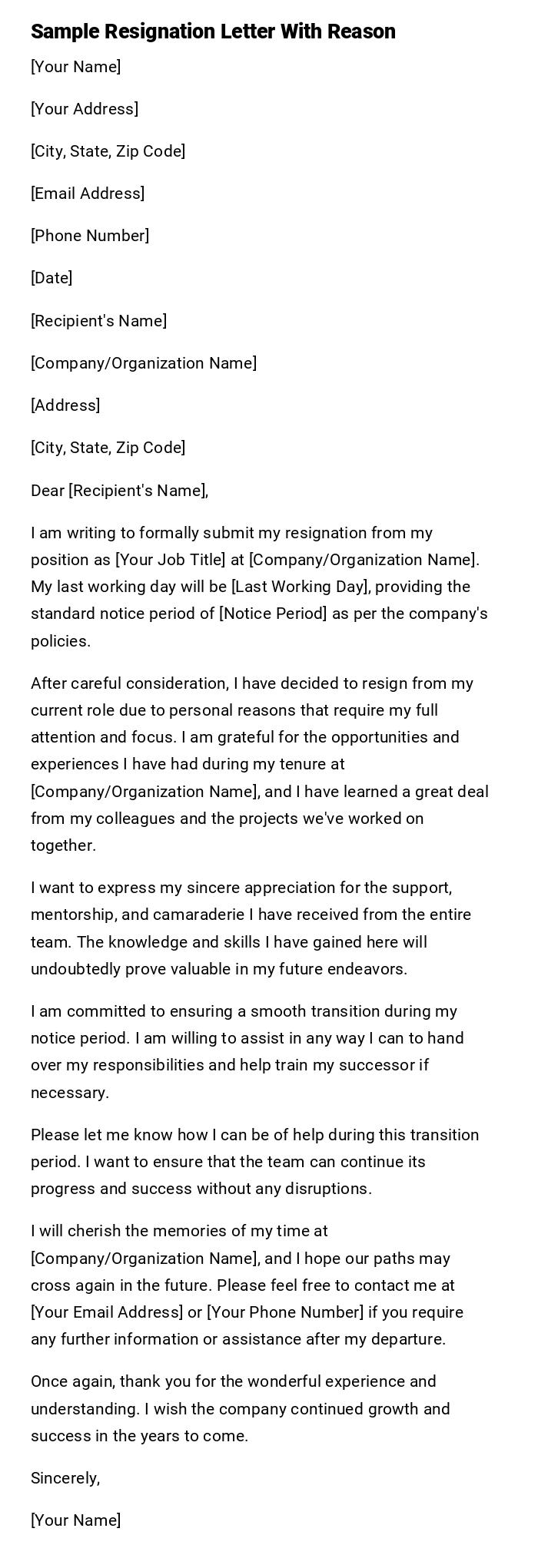
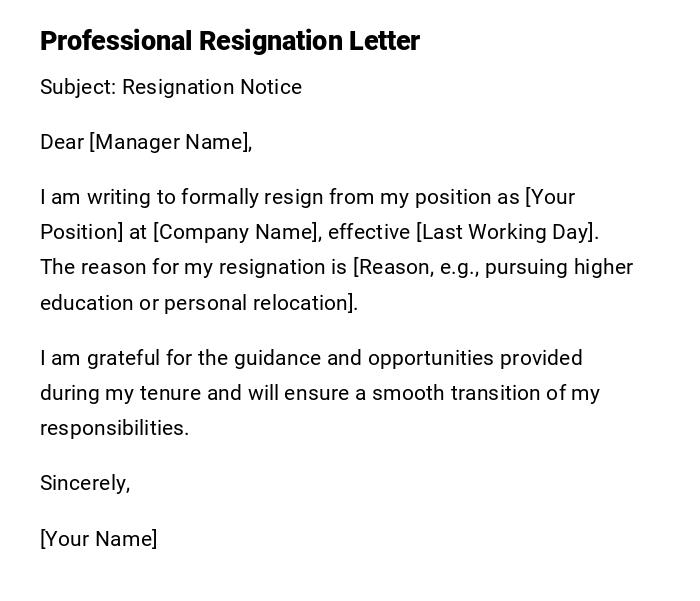
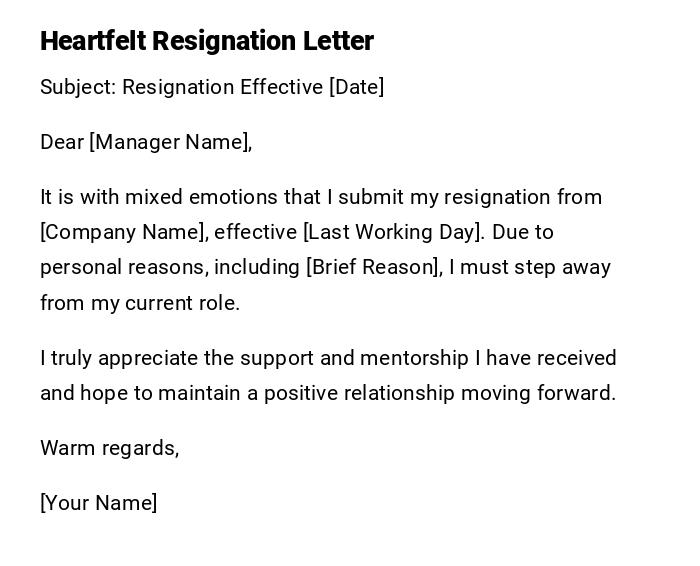
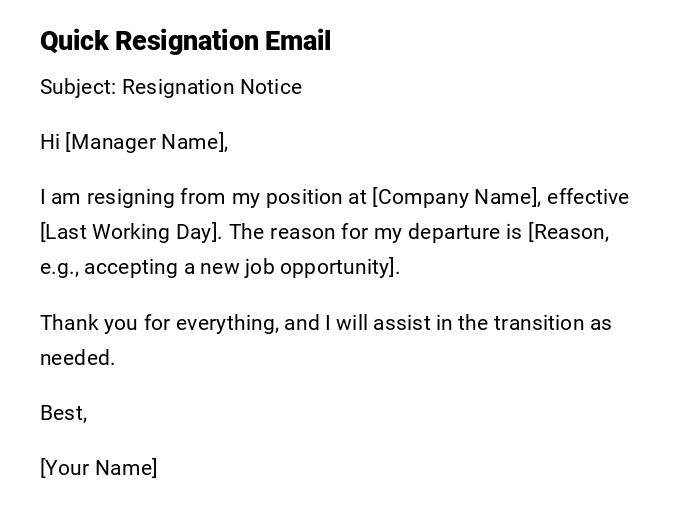
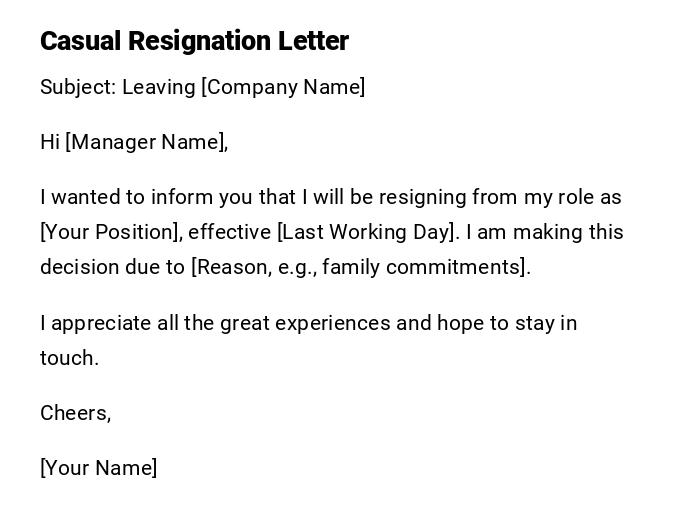
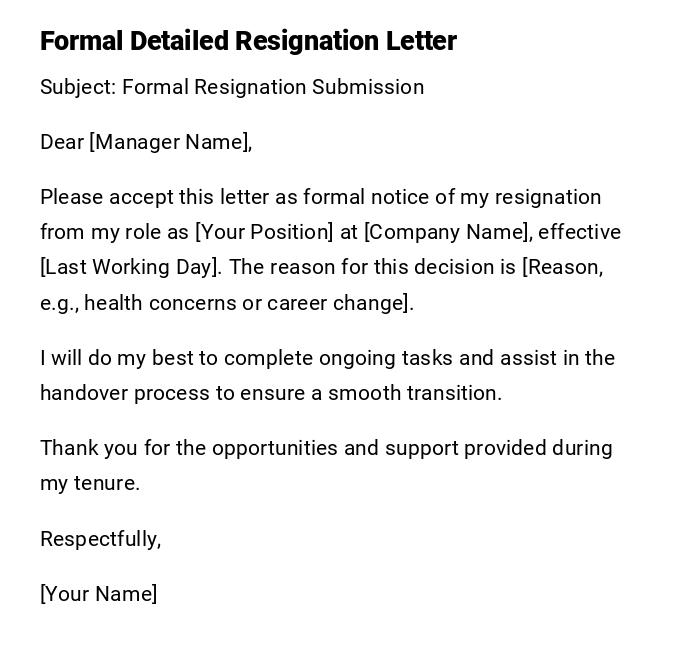

 Download Word Doc
Download Word Doc
 Download PDF
Download PDF